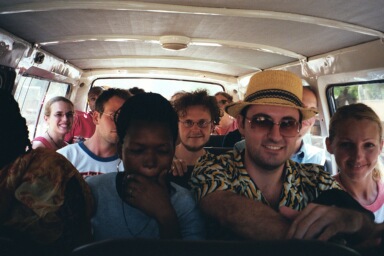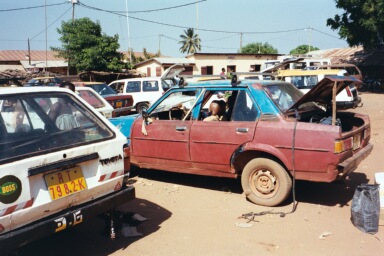|
I figure that since I'm in the Peace Corps and may never have the chance to do so again, I should live each day as an adventure. One might think that a tall order, but it's actually quite simple. Any time I think, "Gee, today has been boring," I can always just go somewhere. Normally the "somewhere" would be the interesting part of "going somewhere," but not in Togo. Actually, the going, the travel itself, never fails to be an adventure.
In theory, Togo has several modes of transportation: planes get you to the country, missionaries in Kara have a plane, andthe President has a personal runway that can accommodate a 747; there's a train leftover from German colonialism that makes a reported 7-hour journey from Kpalimé to Lomé, which could be outerun by anyone who biked that route or decided to walk it quickly; there are cargo ships that dock in Lomé's port; various tribes navigate in canoes; and there are various eighteen-wheelers that one can sometimes see 30 or 40 men pushing up a mountain, or flipping back onto its wheels and reloading with bags of cement, or providing shade for the driver praying on the shoulder fo the National Highway. The most common transportation by far, though, is the taxi.
Taxis come in various forms. Inside cities, there are route taxis that follow highly irregular schedules. If you can successfully flag one down, they'll charge you 15 cents to drop you anywhere along their short route. "If" is the operative word for hailing route taxis, however. I walked for 50 minutes with two large bags of groceries on Christmas Eve, scanning desperately for a route taxi, thinking all the while how much my arms hurt, how much my shoulders hurt, how much my neck hurt, and how easy it would bve to blow this joint and go back to the States in order to do something productive with my life.
While you usually can't hail a route taxi to save your life, you almost can't beat away the most common form of taxi with a stick. "Taxi-motos" or "Zs" consist of any 2-wheeled motorized bike--mopeds, scooters, or full-out motorcycles. As you're standing on the side of the road for hours waiting for route taxis, they honk at you constantly; "On y va?" They're plentiful; quick, cheap (15 cents will get you anywhere in the city or to a neighboring village), amazingly convenient, and strictly forbidden for PCVs in Togo. If we're caught on one we are Administratively Separated and packed off to the US no questions asked, the Peace Corps equivalent of Dishonorable Discharge. And sometimes, when you've walked 50 minutes carrying 2 heavy bags or you're walking alone at night with men cat-calling, making kissy-noises at you, and following you, you start to wonder whether that seems like such a bad option.
Honestly, Peace Corps's no-tolerance moto policy is the single mile of red tape that enfuriates PCVs the most. Not many years ago PCVs were issued their own motorcycles, but Peace Corps recently deemed them too dangerous. Instead of solving the problem the way neighboring Benin did--obliging PCVs to wear full-face helmets--PC-Togo decided to forbid moto-riding altogether. I can't imagine anyone reading this spiel having any idea how frustrating the policy is, but suffice it to say that if I'd had any clue how much stress it would cause before I came here, I would have flatly refused to serve in Togo.
As for travel outside cities, bush taxis are the second major reason sentiments run so hot over taxi-motos. Taxi-brousses are our only option for travel between cities or between cities and villages. They consist of 5-person cars, minivans, vans, or pickup trucks and are guaranteed to raise your bloodpressure.
For starters, to take one, you're going to have to argue, scream, and yell; just accept it. If you're foreign, bush-taxi drivers are convinced that it's their God-given right to cheat you. Luckily, there's a set fare for most places, but they think everything else is negotiable. Let's take bags, for example. A driver would rarely dare ask a Togolese person to pay for transportation of a bag, but, then again, I don't look Togolese, do I? Bikes are an even bigger source of cheating. Greer and I knew we were being taken for a ride when a driver demanded 1000F to take each bike from Kara to Dapaong, but there was nothing we could do but pay it--the bikes were kind of an essential part of our bike trip, and everyone in the taxi station got a kick out of helping the driver cheat two white people.
If your pulse isn't erratic after discussing the price of your voyage, it certainly will be when you discover that there is absolutely no way to tell when the car will leave. Taxis are not on a set schedule. Instead, they leave when the car is full of passengers. And "full" means something different from what one could possibly believe without visiting Togo. A car that has five seatbelts, for example, won't budge until it has six passeners plus the driver. Thre are often eight adults and three children in a circa 1972 Toyota Camry. The back will undoubtedly be spilling over with 8-gallon basins full of bananas to sell at the market, 100-lb. bags of cement, and a couple of hog-tied goats. There will certainly be a few chickens and guinea fowl flapping around on the steaming floorboard, and a bike or sack of fertilizer bungeed to the top. Once I saw four men shoving a live cow into a hatchback, and twice the driver's apprentice rode in the trunk to make room for more passengers. Taxi-driver unions have been cracking down on drivers who cram too many passengers in their cars. That hasn't bothered the drivers in my village much, though, because the union stand is in the middle of a cashew forest; the driver loads too many people into or on top of the car, stops on one side of the forest for them to hop out or off, then waits for them to run around behind the union leaders and rejoin the car on the other side! It's a riot.
The most terrifying ride I ever took involved hitching a ride in an 11-person van. There was no other way out of my village, so I climbed into a van that had been chartered by a Kara soccer team. There were 17 of us spectators and coaches in the van and the entire team of 11-year-old boys rode the whole 25 miles on top! Imagining how guilty I would feel if we crashed and the boys all died, I begged them to let me trade places with one of the kids on top, but the coaches and driver wouldn't hear of it. Among other restrictions, PCVs are forbidden to ride after dark, so I was extremely lucky that dusk lasted two hours that night. And, as if all that were not enough for me to forswear taxis, we tapped a bike en route. I couldn't see through the sea of 14 faces behind me, but I think the biker was alright after the ordeal. I was mildly freaked out, though, and earned the privilege of carrying that image with me for the duration of my bike trip.
| Peace Corps Volunteers in a rented taxi. |

|
| I am on the left in a red shirt, sitting on a tire. |
Depending how wealthy you're feeling, you can always "louer" (rent) a car. That involves paying for all the seats so that the driver does not have to find other passengers. Paying all the places in a car will probably involve a bit more arguing, but the comfort of having the car all to yourself (think: no goats!) from doorstep to doorstep can be worth it. Volunteers usually pay all the places when we travel in groups. It slices off a lot of time if a taxi doesn't have to stop at every station in hopes of shoving in a few more passengers.
| Classic Soudou Taxi |

|
| This is one of my favorites. |
The cars I take most often are those between Bafilo and Soudou (the conglomeration of villages that contains Tchalimdé, where I live). Soudou cars have a reputation among PCVs for being the worst in Togo. My guess is that they are horrible because the road is just washed out and rocky enough to prevent taxiowners from wanting to buy a nice car. There are plenty of village roads worse than mine, but Soudou taxiowners can get away with such beaten-up cars because the trip is only 8 miles. That means a car on its last lug can be pushed most of the way.
Lots of car-pushing takes place on the Soudou-Bafilo road. First of all, I have yet to see a car that could start on its own without being pushed off. That doesn't surprise me, given that I've yet to ride in a car younger than I am. But once the engine catches, the fun really begins. You can enjoy the hair-tossing of dusty wind blasting through the holes where windows used to be and gaze at the ground passing through the holes in the floorboard. Plus, the driver always cuts the engine on downhill slopes, which provides no less than three opportunities to thank your lucky stars that the engine restarts and you don't have to push the car up the next hill. Really, is there often this much excitement on the subway in the States?
On days that I am frustrated that taxis are unreliable, unnerving, and down-right scary, I force myself to look on the good side: there are tons of things I have learned from relying on Togolese taxis. First of all, what is really so important that you really have to get somewhere right now? Second, I now know how to hotwire a car, since there are absolutely no car keys in the entire region around Bafilo. Third, I have learned that you can push off a car backwards--did you know that? I had no idea! Most importantly, I have learned that there are so many unnecessary parts on cars. Like dashboards, windows, and floorboards. And brakes. I mean, what a terrible redundancy to have brakes and a horn. If you don't have brakes, you just honk, and people fly out of the way. Or if you have brakes, why would you need a horn? To be technical about it, if you can just throw the transmission into neutral and rev the engine, you don't really need brakes or a horn! Exciting, huh?
|